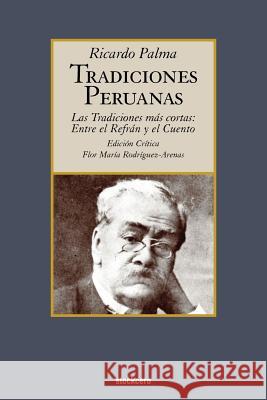Tradiciones peruanas - Las tradiciones más cortas: entre el refran y el cuento » książka
Tradiciones peruanas - Las tradiciones más cortas: entre el refran y el cuento
ISBN-13: 9789871136582 / Hiszpański / Miękka / 2006 / 176 str.
Ricardo Palma's Tradiciones Peruanas make up one of the most widely read works in the ambit of Spanish language literature. They were produced along almost seven decades, between the 19th and 20th centuries, offering an analytical interpretation of the constructive process of the Peruvian nationality, by one of the most incisively critical writers in Peru at that time. Palma is noted for creating the literary genre, Tradicion -a combination of fiction and history that forms a kind of historical anecdote. His works concerning colonial and early republican Peru were published in a series of volumes called Tradiciones Peruanas, containing more than 800 different texts. As a literature resource, the Tradiciones Peruanas allow readers to acquaint themselves with the general feeling of Peruvian history. Ricardo Palma was a writer who searched for inspiration from the ample historic register of his country, written as well as oral. He was born in the heart of a new nation which had only acquired its independence a decade before and which, under the name of the Viceroyalty of New Castille or Peru, had been one of the most important Spanish centers in America. Thanks to his comprehension of the heterogeneous characteristics which defined his society, he forged an image of Peruvian culture, through his Tradiciones. His origin (an illegitimate child of a mestizo, and a cuarterona (Quadroon a corruption of quarteroon, Span. cuarteron, from cuarto, ] strictly a person having one-fourth Negro blood, the offspring of a mulatto and a white) in a conservative society motivated him to stand out socially, although there is no global explanation of his work attributable to this. The fact is that he dedicated his efforts to show and explain to future generations the values, problems and social, economical and political idiosyncrasies of the structure of the Peruvian people, and the role that class and race had played in the formation and advancement of society. His creative process took him to conceive his Tradiciones a work with its own characteristics and simple appearance, which is just now being understood in its modern aspects. Therefore, the labor of studying the work of a nineteenth century Latin American writer of Palma importance is not that of reducing his texts to a one-dimensional sense, but rather to identify the characteristics which define his peculiar dynamism and productivity which makes his production belong to the concert of world literature. In this edition prof. Flor Maria Rodriguez-Arenas exposes an in-depth analysis that, altogether with text notes and the short extension of the selected Tradiciones, contribute to an excellent and friendly approach to the study of one of the cornerstones of the Latin American literature.











